Minister president (Germany)
The Minister President (Ministerpräsident) is the head of state and government in thirteen of Germany's sixteen states.
 |
|---|
| This article is part of a series on the politics and government of Germany |
|
|
Head of State |
|
Executive
|
|
|
Administrative divisions
|
|
In the three states of Berlin, Free Hanseatic City of Bremen and Free and Hanseatic City of Hamburg the heads of the state hold different titles:
- in Berlin Governing Mayor (Regierender Bürgermeister) (before 1951 Mayor)
- in Bremen President of the Senate and Mayor (Präsident des Senats und Bürgermeister)
- in Hamburg First Mayor (Erster Bürgermeister).
In the since-1952 defunct states of Baden and Württemberg-Hohenzollern the heads of state held the title State President (Staatspräsident). Nevertheless, in Germany it is common practice, to call all sixteen heads of the states ministers president if they are referred to collectively. For example, the regular meetings of the sixteen office-holders are called Conference of Ministers President (Ministerpräsidentenkonferenz).
Constitutional roles and powers
As the German constitution (Basic Law) defines the Federal Republic of Germany as a federation, each German state has its own constitution. The Basic Law gives the states a broad discretion to determine their respective state structure, only stating that each German state has to be a social and democratic republic under the rule of law (Article 28.1). In practice all German states have adopted some form of a mixed parliamentary republican system: Despite some differences between the individual state constitutions, the Ministers President have both typical powers of an executive leader (for example appointing and dismissing cabinet members or defining the political guidelines of the cabinet) and typical powers and functions of a head of state (for example the power to grant pardons on behalf of the state and to perform certain ceremonial duties). As such, their powers and functions resemble those of an executive president, but in contrast to a presidential system, they are not directly elected and depend on the confidence of the respective state parliament. Thus, the constitutional position of a minister president differs from that of the Chancellor of Germany at the federal level, who only holds the role of a chief executive leader, while the President of Germany performs the more ceremonial powers and functions of the federal head of state.
Even though all sixteen ministers president hold roughly the same position in their states, there are also some important differences between the provisions of the state constitutions with regard to the head of state and government. This begins with the election procedure: All ministers president are elected by the state parliament, but while in some states a majority of parliament members is needed for a successful election, in other states a simple majority (a majority of votes cast) is sufficient. The same goes for recall procedures: In some states, the parliament may simply vote an officeholder out of office, while in other states the parliament has to elect a new officeholder at the same time (Constructive vote of no confidence). In Bavaria, the constitution does not allow a recall of the minister president at all. In fifteen states, the state constitution defines the minister president as the leader of the cabinet, giving him or her the right, to determine the cabinet's political guidelines, but this is not the case in Bremen, where the President of the Senate and Mayor only has a ceremonial precedence over the other cabinet members. There are also differences regarding the ministers president power, to shape his or her cabinet: While in some states the office-holder is free to appoint or dismiss cabinet ministers at his or her discretion, in other states there are limits to this power, while the constitution of Bremen does not give the President of the Senate and Mayor any power, to directly influence the composition of his or her cabinet.
| State | Title | Election threshold | Recall procedure | Position in cabinet | Power to shape the cabinet | Right to grant pardon | Minimum age | Other provisions |
|---|---|---|---|---|---|---|---|---|
| Baden-Württemberg[1] | Minister President | majority of members | constructive vote of no confidence | guideline competence | cabinet appointments subject to parliamentary approval, the state parliament may recall individual cabinet ministers with a two-thirds majority | yes | 35 | |
| Bavaria[2] | Minister President | simple majority | none | guideline competence | cabinet appointments subject to parliamentary approval | yes | 40 | |
| Berlin[3] | Governing Mayor | simple majority | vote of no confidence, but if the state parliament does not elect a new Governing Mayor within 21 days, the former officeholder is reinvested automatically | guideline competence | full | no (whole cabinet) | 18 (de facto) | |
| Brandenburg[4] | Minister President | majority of members (first and second ballot), plurality (third ballot) | constructive vote of no confidence | guideline competence | full | yes | 18 (de facto) | |
| Bremen[5] | President of the Senate and Mayor | simple majority | constructive vote of no confidence | ceremonial precedence | none | no (whole cabinet) | 18 | may not be a member of the state parliament |
| Hamburg[6] | First Mayor | majority of members | constructive vote of no confidence | guideline competence | cabinet appointments subject to parliamentary approval | no (whole cabinet) | 18 | may not be a member of the state parliament |
| Hesse[7] | Minister President | majority of members | vote of no confidence | guideline competence | dismissal of cabinet appointments subject to parliamentary approval | yes | 18 (de facto) | members of noble houses, which have reigned in Germany before 1918, are ineligible for office |
| Lower Saxony[8] | Minister President | majority of members or plurality, if the state parliament does not elect a minister president in 21 days and does not dissolve itself thereupon | constructive vote of no confidence | guideline competence | cabinet appointments subject to parliamentary approval | yes | 18 (de facto) | |
| Mecklenburg-Vorpommern[9] | Minister President | majority of members or plurality, if the state parliament does not elect a minister president in 28 days and does not dissolve itself thereupon | constructive vote of no confidence | guideline competence | full | yes | 18 (de facto) | |
| North Rhine-Westphalia[10] | Minister President | majority of members (first ballot), simple majority (second and third ballot), runoff (fourth ballot) | constructive vote of no confidence | guideline competence | full | yes | 18 | has to be a member of the state parliament |
| Rhineland-Palatinate[11] | Minister President | majority of members | vote of no confidence | guideline competence | full | yes | 18 (de facto) | |
| Saarland[12] | Minister President | majority of members | vote of no confidence | guideline competence | cabinet appointments and dismissals subject to parliamentary approval | no (whole cabinet) | 18 (de facto) | |
| Free State of Saxony[13] | Minister President | majority of members (first ballot), simple majority (following ballots) | constructive vote of no confidence | guideline competence | full | yes | 18 (de facto) | |
| Saxony-Anhalt[14] | Minister President | majority of members or simple majority, if the state parliament does not elect a minister president in 14 days and does not dissolve itself thereupon | constructive vote of no confidence | guideline competence | full | yes | 18 (de facto) | |
| Schleswig-Holstein[15] | Minister President | majority of members (first and second ballot), plurality (third ballot) | constructive vote of no confidence | guideline competence | full | yes | 18 (de facto) | |
| Free State of Thuringia[16] | Minister President | majority of members (first and second ballot), plurality (third ballot) | constructive vote of no confidence | guideline competence | full | yes | 18 (de facto) |
By virtue of their position in the Bundesrat, the ministers president can exert considerable influence on national politics within the federal structure. Along with several of their ministers, they commonly represent their state in the Bundesrat (the German Federal Council). Each state government is represented in the Bundesrat by three to six delegates, depending on the state's population.
Deputies
The Ministers President appoint one (or in some states two) member(s) of their cabinet as their deputies. In most states the deputy of the minister president holds the title Deputy Minister President. Brandenburg, Saxony, Saxony-Anhalt and Schleswig-Holstein have a higher ranking First Deputy Minister President and a lower ranking Second Deputy Minister President. Bavaria has a higher ranking Deputy Minister President and a lower ranking Additional Deputy Minister President. Berlin has two equally ranking Mayors deputizing for the Governing Mayor, while Bremen has a Mayor deputizing for the President of the Senate and Mayor and Hamburg has a Second Mayor deputizing for the First Mayor.
List of current office-holders
The longest-serving incumbent office-holder is Volker Bouffier, who serves as the 8th Minister President of Hesse since 31 August 2010. Bodo Ramelow, the 7th Minister President of Thuringia (since 4 March 2020), is the shortest-serving incumbent, although he already held this office from 2014 until 5 February 2020.
| Portrait | Name | Title | entered office | Party | Deputy Title | |
|---|---|---|---|---|---|---|
.svg.png) Baden-Württemberg | .jpg) | Winfried Kretschmann | 9th Minister President of Baden-Württemberg | 12 May 2011 | Alliance 90/The Greens | Thomas Strobl (CDU) Deputy Minister President |
 Free State of Bavaria |  | Markus Söder | 13th Minister President of Bavaria | 16 March 2018 | CSU | Hubert Aiwanger (Free Voters) Deputy Minister President Joachim Herrmann (CSU) Additional Deputy Minister President |
 Berlin | _by_Sandro_Halank.jpg) | Michael Müller | 14th Governing Mayor of Berlin | 11 December 2014 | SPD | Klaus Lederer (The Left) Mayor Ramona Pop (Alliance 90/The Greens) Mayor |
 Brandenburg | .jpg) | Dietmar Woidke | 3rd Minister President of Brandenburg | 28 August 2013 | SPD | Michael Stübgen (CDU) First Deputy Minister President Ursula Nonnenmacher (Alliance 90/The Greens) Second Deputy Minister President |
 Free Hanseatic City of Bremen |  | Andreas Bovenschulte | 9th President of the Senate and Mayor of Bremen | 15 August 2019 | SPD | Maike Schaefer (Alliance 90/The Greens) Mayor |
 Free and Hanseatic City of Hamburg | .jpg) | Peter Tschentscher | 15th First Mayor of Hamburg | 28 March 2018 | SPD | Katharina Fegebank (Alliance 90/The Greens) Second Mayor |
 Hesse | 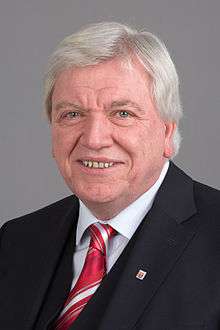 | Volker Bouffier | 8th Minister President of Hesse | 31 August 2010 | CDU | Tarek Al-Wazir (Alliance 90/The Greens) Deputy Minister President |
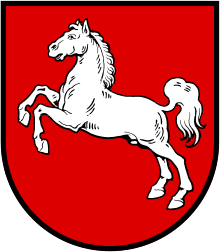 Lower Saxony |  | Stephan Weil | 12th Minister President of Lower Saxony | 19 February 2013 | SPD | Bernd Althusmann (CDU) Deputy Minister President |
.svg.png) Mecklenburg-Vorpommern | 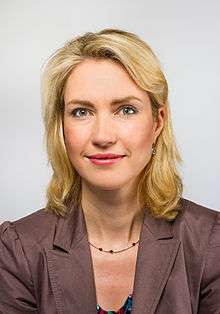 | Manuela Schwesig | 5th Minister President of Mecklenburg-Vorpommern | 4 July 2017 | SPD | Lorenz Caffier (CDU) Deputy Minister President |
 North Rhine-Westphalia |  | Armin Laschet | 11th Minister President of North Rhine-Westphalia | 27 June 2017 | CDU | Joachim Stamp (FDP) Deputy Minister President |
 Rhineland-Palatinate |  | Malu Dreyer | 8th Minister President of Rhineland-Palatinate | 16 January 2013 | SPD | Volker Wissing (FDP) Deputy Minister President |
 Saarland |  | Tobias Hans | 11th Minister President of Saarland | 1 March 2018 | CDU | Anke Rehlinger (SPD) Deputy Minister President |
 Free State of Saxony | .jpg) | Michael Kretschmer | 4th Minister President of Saxony | 13 December 2017 | CDU | Wolfram Günther (Alliance 90/The Greens) First Deputy Minister President Martin Dulig (SPD) Second Deputy Minister President |
 Saxony-Anhalt | _09.jpg) | Reiner Haseloff | 6th Minister President of Saxony-Anhalt | 19 April 2011 | CDU | Petra Grimm-Benne (SPD) First Deputy Minister President Claudia Dalbert (Alliance 90/The Greens) Second Deputy Minister President |
 Schleswig-Holstein | .jpg) | Daniel Günther | 14th Minister President of Schleswig-Holstein | 28 June 2017 | CDU | Monika Heinold (Alliance 90/The Greens) First Deputy Minister President Hainer Garg (FDP) Second Deputy Minister President |
 Free State of Thuringia | 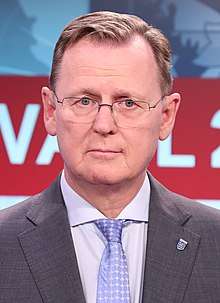 | Bodo Ramelow | 7th Minister President of Thuringia | 4 March 2020 | The Left | Wolfgang Tiefensee (SPD) Deputy Minister President |
Last office-holders in former states of the Federal Republic of Germany
| Portrait | Name | Title | in office | Party | Deputy Title | |
|---|---|---|---|---|---|---|
 Baden |  | Leo Wohleb | State President of Baden | 24 June 1947 - 25 April 1952 | CDU | Alfred Schühly (CDU) Deputy State President |
 Württemberg-Baden | 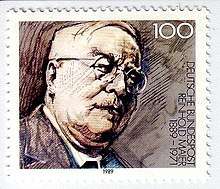 | Reinhold Maier | Minister President of Württemberg-Baden | 19 September 1945 - 25 April 1952 | FDP | Hermann Veit (SPD) Deputy Minister President |
 Württemberg-Hohenzollern |  | Gebhard Müller | 3rd State President of Württemberg-Hohenzollern | 13 August 1948 - 25 April 1952 | CDU | Viktor Renner (SPD) Deputy State President |
Trivia
The office of a minister president is both highly prestigious in its own right and acts as a potential "career springboard" for German politicians.
Three out of twelve Presidents of Germany have been head of a state before becoming President:
- Richard von Weizsäcker, 9th Governing Mayor of Berlin (1981–1984)
- Johannes Rau, 6th Minister President of North Rhine-Westphalia (1978–1998)
- Christian Wulff, 10th Minister President of Lower Saxony (2003–2010)
One out of 13 Presidents of the Bundestag has been head of a state before becoming President:
- Kai-Uwe von Hassel, 6th Minister President of Schleswig-Holstein (1954–1963)
Four out of eight Chancellors of Germany have been head of a state before becoming Chancellor:
- Kurt-Georg Kiesinger, 3rd Minister President of Baden-Württemberg (1958–1966)
- Willy Brandt, 4th Governing Mayor of Berlin (1957–1966)
- Helmut Kohl, 3rd Minister President of Rhineland-Palatinate (1969–1976)
- Gerhard Schröder, 7th Minister President of Lower Saxony (1990–1998)
One out of nine Presidents of the Federal Constitutional Court has been head of a state before becoming President:
- Gebhard Müller, 3rd State President of Württemberg-Hohenzollern (1948–1952), 2nd Minister President of Baden-Württemberg (1953–1958)
Many more Ministers President went on to become members of the federal government, EU institutions or associate judges of the Federal Constitutional Court of Germany for example.
The three longest serving office-holders were:
- Peter Altmeier, 2nd Minister President of Rhineland-Palatinate (1947–1969, 21 years, 10 months, 9 days)
- Franz-Josef Röder, 5th Minister President of Saarland (1959–1979, 20 years, 2 months, 3 days)
- Wilhelm Kaisen, 2nd President of the Senate and Mayor of Bremen (1945–1965, 19 years, 11 months, 19 days)
The three shortest serving office-holders were:
- Thomas Kemmerich, 6th Minister President of Thuringia (2020, 28 days)
- Hans-Jochen Vogel, 8th Governing Mayor of Berlin (1981, 4 months, 19 days)
- Christoph Ahlhaus, 13th First Mayor of Hamburg (2010–2011, 6 months, 13 days)
There have been six female heads of a German state:
- Heide Simonis, 11th Minister President of Schleswig-Holstein (1993–2005)
- Christine Lieberknecht, 4th Minister President of Thuringia (2009–2014)
- Hannelore Kraft, 10th Minister President of North Rhine-Westphalia (2010–2017)
- Annegret Kramp-Karrenbauer, 10th Minister President of Saarland (2011–2018)
- Malu Dreyer, 8th Minister President of Rhineland-Palatinate (incumbent since 2013)
- Manuela Schwesig, 5th Minister President of Mecklenburg-Vorpommern (incumbent since 2017)
One person has managed to become Minister President of two different states, which did not merge into one another:
- Bernhard Vogel, 4th Minister President of Rhineland-Palatinate (1976–1988) and 2nd Minister President of Thuringia (1992–2003)
Two persons have been Ministers President of two states before and after they had merged into one another:
- Reinhold Maier, Minister President of Württemberg-Baden (1945–1952), 1st Minister President of Baden-Württemberg (1952–1953)
- Gebhard Müller, 3rd State President of Württemberg-Hohenzollern (1948–1952), 2nd Minister President of Baden-Württemberg (1953–1958)
So far, there has been already one Minister President from a recognized national minority: Stanislaw Tillich, who served as the 3rd Minister President of Saxony between 2008–2017, is of Sorbian origin and speaks Sorbian and German as his mother tongue.
David McAllister, who served as the 11th Minister President of Lower Saxony between 2010–2013, has been the first office-holder with dual nationality (Germany and United Kingdom).
See also
- Ministerpräsident (Prussia)
References
- "Verfassung des Landes Baden-Württemberg vom 11. November 1953 (GBl. S. 173)" (PDF). Lpb-bw.de. Retrieved 12 November 2018.
- "Bayerische Verfassung" (PDF). Uni-augsburg.de. Archived from the original (PDF) on 7 October 2011. Retrieved 12 November 2018.
- "Verfassung von Berlin Vom 23. November 1995" (PDF). Datenschutz.fu-berlin.de. Retrieved 12 November 2018.
- "Verfassung des Landes Brandenburg". Bravors.brandenburg.de. Retrieved 12 November 2018.
- "Landesverfassung der Freien Hansestadt Bremen" (PDF). Bremische-buergerschaft.de. Retrieved 12 November 2018.
- "Landesrecht - Justiz - Portal Hamburg". Landesrecht-hamburg.de. Retrieved 12 November 2018.
- "Verfassung des Landes Hessen" (PDF). Starweb.hessen.de. Retrieved 12 November 2018.
- "VORIS Artikel 29 Verf ND - Landesnorm Niedersachsen - - Regierungsbildung - Niedersächsische Verfassung vom 19. Mai 1993 - gültig ab: 01.06.1993". Nds-voris.de. Retrieved 12 November 2018.
- "VERFASSUNG DES LANDES MECKLENBURG-VORPOMMERN" (PDF). Landtag-mv.de. Archived from the original (PDF) on 1 December 2017. Retrieved 12 November 2018.
- "Verfssung der North Rhine-Westphalia" (PDF). Krefeld.de. Archived from the original (PDF) on 26 October 2018. Retrieved 12 November 2018.
- "Verfassung für Rheinland-Pfalz" (PDF). Rlp.de. Retrieved 12 November 2018.
- "VERFASSUNG des Saarlandes (SVerf) vom 15. Dezember 1947 zuletzt geändert durch das Gesetz vom 13. Juli 2016 (Amtsbl. I S. 178)" (PDF). Landtag-saar.de. Archived from the original (PDF) on 26 October 2018. Retrieved 12 November 2018.
- "REVOSax Landesrecht Sachsen : Verfassung". Revosax.sachsen.de. Archived from the original on 22 March 2019. Retrieved 12 November 2018.
- "Landesrecht Sachsen-Anhalt Verf ST - Landesnorm Sachsen-Anhalt - Gesamtausgabe - Verfassung des Landes Sachsen-Anhalt vom 16. Juli 1992 - gültig ab: 18.07.1992". Landesrecht.sachsen-anhalt.de. Retrieved 12 November 2018.
- "Gesetze-Rechtsprechung Schleswig-Holstein Verf SH 2014 - Landesnorm Schleswig-Holstein - Gesamtausgabe - Verfassung des Landes Schleswig-Holstein in der Fassung vom 2. Dezember 2014 - gültig ab: 11.12.2014". Gesetze-rechtsprechung.sh.juris.de. Retrieved 12 November 2018.
- "Landesrecht TH Verf TH - Landesnorm Thüringen - Gesamtausgabe - Verfassung des Freistaats Thüringen vom 25. Oktober 1993 - gültig ab: 30.10.1993". Landtag.thueringen.de. Retrieved 12 November 2018.